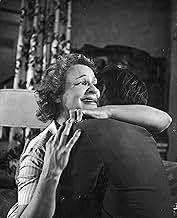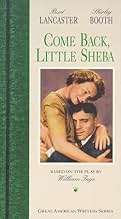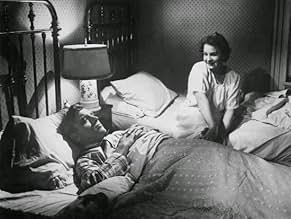IMDb RATING
7.5/10
5.7K
YOUR RATING
An emotionally remote recovering alcoholic and his dowdy, unambitious wife face a personal crisis when they take in an attractive lodger.An emotionally remote recovering alcoholic and his dowdy, unambitious wife face a personal crisis when they take in an attractive lodger.An emotionally remote recovering alcoholic and his dowdy, unambitious wife face a personal crisis when they take in an attractive lodger.
- Won 1 Oscar
- 7 wins & 8 nominations total
Robert Fuller
- Extra
- (uncredited)
Ned Glass
- Man at AA Meeting
- (uncredited)
William Haade
- Hospital Intern
- (uncredited)
Virginia Hall
- Blonde in Diner
- (uncredited)
Anthony Jochim
- Mr. Cruthers
- (uncredited)
Peter Leeds
- Milkman
- (uncredited)
Kitty McHugh
- Pearl Stinson - AA Member
- (uncredited)
Paul McVey
- Postman
- (uncredited)
Beverly Mook
- Judy Coffman
- (uncredited)
Virginia Mullen
- Henrietta Colby - AA Member
- (uncredited)
- Director
- Writers
- All cast & crew
- Production, box office & more at IMDbPro
Featured reviews
William Inge's play transfers nicely to the big screen, with perfectly cast leads Shirley Booth and Burt Lancaster.
A middle aged, childless couple struggles with the husband's periodic alcoholic "episodes". When they rent out a room in their house to a young college girl, the audience learns a lot about the couple just by observing their reactions to "the young people". "Doc" Delaney exhibits fatherly, protective feelings toward the young woman, expressing disgust when she brings a young man to her room. A regular at AA meetings, he eventually "gets sick" again. Determined never to give up, his devoted wife Lola stands by her man. The ending leaves us hopeful that all will turn out well.
There are many beautiful moments in this film, assuring a lover of tearjerkers a full pay-off! Shirley Booth deserved her 1953 Oscar for her portrayal of Lola Delaney. Oh, and don't look for little Sheba, she won't be back.
A middle aged, childless couple struggles with the husband's periodic alcoholic "episodes". When they rent out a room in their house to a young college girl, the audience learns a lot about the couple just by observing their reactions to "the young people". "Doc" Delaney exhibits fatherly, protective feelings toward the young woman, expressing disgust when she brings a young man to her room. A regular at AA meetings, he eventually "gets sick" again. Determined never to give up, his devoted wife Lola stands by her man. The ending leaves us hopeful that all will turn out well.
There are many beautiful moments in this film, assuring a lover of tearjerkers a full pay-off! Shirley Booth deserved her 1953 Oscar for her portrayal of Lola Delaney. Oh, and don't look for little Sheba, she won't be back.
Days of Wine and Roses and The Lost Weekend deal with the problem of those afflicted with Alcoholism. Both are fine films. This movie is better than those two and that's only part of the story in this picture. Shirley Booth gives a most certainly well deserved Academy Award winning performance as the wife of a recovering alcoholic husband. Burt Lancaster in a role he is not often remembered for is the husband. A once proud and respected person who falls by the wayside due to his drinking has picked himself up and is determined to start over again even though various demons still linger inside him. I first saw this motion picture on New Years eve back in the late 60's on NBC's Saturday Night at the Movies. During the week preceding the showing NBC advertised it with the clip of Lancaster going after Booth with a kitchen knife. My older sibling and I not really old enough to know about such things joked about the scene. When we watched the movie and it came to that part we were no longer joking. I didn't see it for many years until it aired on AMC. The film is as powerful today in its story and it's acting performances as when I first saw it and I'm certain when it was first released in 52. A must see.
Shirley Booth was a remarkably versatile actress - she did comedies, musicals, and dramas - and won the adoration of critics and audiences in all. But as with Agnes Moorehead and Eve Arden, her success in a TV comedy, "Hazel" tended to over-shadow her work on stage or film. A well-liked comedic actress on Broadway since the 1930s, she reinvented herself as a dramatic actress in 1949 with COME BACK, LITTLE SHEBA, winning every award in sight. Although the film version was offered to the likes of Bette Davis (who turned it down because she felt she couldn't bring to the role the "gorgeous vagueness" Booth had), Hal Wallis wisely went with Booth to recreate her stage role, casting Burt Lancaster for box-office appeal.
Booth's performance as Lola is astonishing, filled with nervous energy and anxiety, living on the edge - ask anyone who's ever lived with an alcoholic - every gesture, every emotion she plays, is honest and accurate. When I finally saw this film in the early 1990s, I was floored by Booth - where in heck had she done her research? Help for families of alcoholics (the Al-Anon Family Groups) was still several years off when the stage version was done - the resources available to Booth would have been "open" AA meetings and perhaps talking with family members. (Incidentally, the director, Daniel Mann, wasn't finished with AA - a more realistic AA meeting figured in his 1956 I'LL CRY TOMORROW, in which he directed Susan Hayward to an Oscar nomination - ironically, she lost out to Anna Magnani's Mann-directed performance in THE ROSE TATTOO!)
Booth was still alive at the time I first saw this film (around 1991-92), and I knew after watching that, unfortunately, her great success as TV's "Hazel" over-shadowed SHEBA, and that when she died, the obit's would begin, "Shirley Booth, TV's HAZEL, is Dead..." and I was right. Agnes Moorehead had a similar fate - the generation which grew up on "Bewitched" was clueless that Moorehead was one of the finest, most versatile and respected actresses around and, like Booth, every bit the equal of the other leading ladies (whom she'd usually supported). I remember attending a screening for the 50th anniversary of CITIZEN KANE and hearing gasps of astonishment as the cast's names appeared "That was AGNES MOOREHEAD!!!!"
Yes, indeed. And THAT was Shirley Booth, breaking our hearts in COME BACK, LITTLE SHEBA. Forget "Hazel," and bring tissues.
Booth's performance as Lola is astonishing, filled with nervous energy and anxiety, living on the edge - ask anyone who's ever lived with an alcoholic - every gesture, every emotion she plays, is honest and accurate. When I finally saw this film in the early 1990s, I was floored by Booth - where in heck had she done her research? Help for families of alcoholics (the Al-Anon Family Groups) was still several years off when the stage version was done - the resources available to Booth would have been "open" AA meetings and perhaps talking with family members. (Incidentally, the director, Daniel Mann, wasn't finished with AA - a more realistic AA meeting figured in his 1956 I'LL CRY TOMORROW, in which he directed Susan Hayward to an Oscar nomination - ironically, she lost out to Anna Magnani's Mann-directed performance in THE ROSE TATTOO!)
Booth was still alive at the time I first saw this film (around 1991-92), and I knew after watching that, unfortunately, her great success as TV's "Hazel" over-shadowed SHEBA, and that when she died, the obit's would begin, "Shirley Booth, TV's HAZEL, is Dead..." and I was right. Agnes Moorehead had a similar fate - the generation which grew up on "Bewitched" was clueless that Moorehead was one of the finest, most versatile and respected actresses around and, like Booth, every bit the equal of the other leading ladies (whom she'd usually supported). I remember attending a screening for the 50th anniversary of CITIZEN KANE and hearing gasps of astonishment as the cast's names appeared "That was AGNES MOOREHEAD!!!!"
Yes, indeed. And THAT was Shirley Booth, breaking our hearts in COME BACK, LITTLE SHEBA. Forget "Hazel," and bring tissues.
An acting triumph for both Shirley Booth and Burt Lancaster. This film will stay with you for a long time. Booth won a well deserved Oscar for this performance and it is well worth the time to view it. This is not a happy film obviously to look at but if you appreciate great acting as much as I do, you will really enjoy Come Back Little Sheba.
This is an interesting study about the trials of people dealing with disappointment and alcoholism. Lost dreams have been Doc's excuse for turning to the bottle, and a lost little dog (Sheba) symbolizes his wife's search for herself.
The film based on the play is an early study of the pain of addiction. As Doc tells his wife, "Dreams are strange." There is redemption in the fact that Doc asks for forgiveness as his wife regains her sense of dignity.
Booth gives a very believable performance, and Lancaster is excellent playing a man far older than he was at the time. This is a touching, though simplistic, look at the dark side of human nature.
The film based on the play is an early study of the pain of addiction. As Doc tells his wife, "Dreams are strange." There is redemption in the fact that Doc asks for forgiveness as his wife regains her sense of dignity.
Booth gives a very believable performance, and Lancaster is excellent playing a man far older than he was at the time. This is a touching, though simplistic, look at the dark side of human nature.
Did you know
- TriviaShirley Booth's movie debut.
- GoofsWhen Doc takes the bottle from the kitchen cabinet, inexplicably there is no knob on the left hand door. When Lola opens the cabinet to check on the bottle, the knob is there and she uses it to open the same door.
- Quotes
Doc Delaney: Alcoholics are mostly disappointed men.
Lola Delaney: Sure, I know.
[pause]
Lola Delaney: You was never disappointed, were you, Doc?
- ConnectionsFeatured in Film Review: Burt Lancaster (1968)
- How long is Come Back, Little Sheba?Powered by Alexa
Details
- Runtime
- 1h 39m(99 min)
- Color
- Aspect ratio
- 1.37 : 1
Contribute to this page
Suggest an edit or add missing content







































